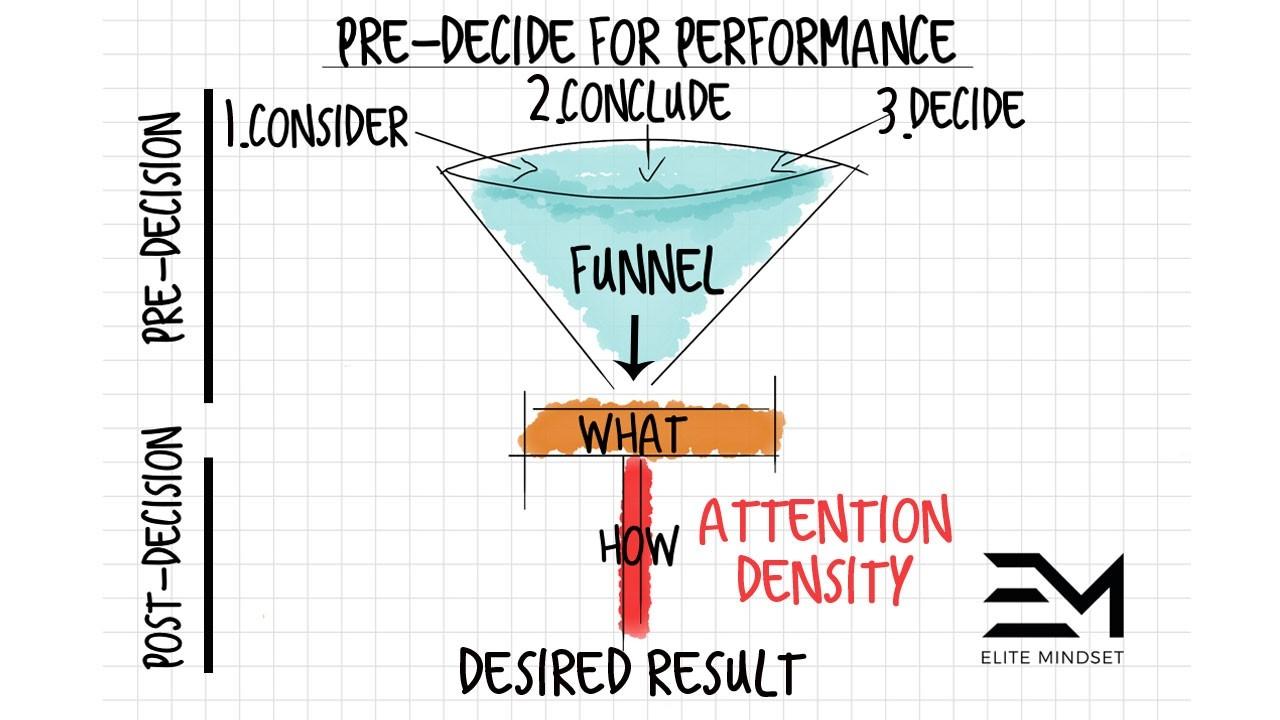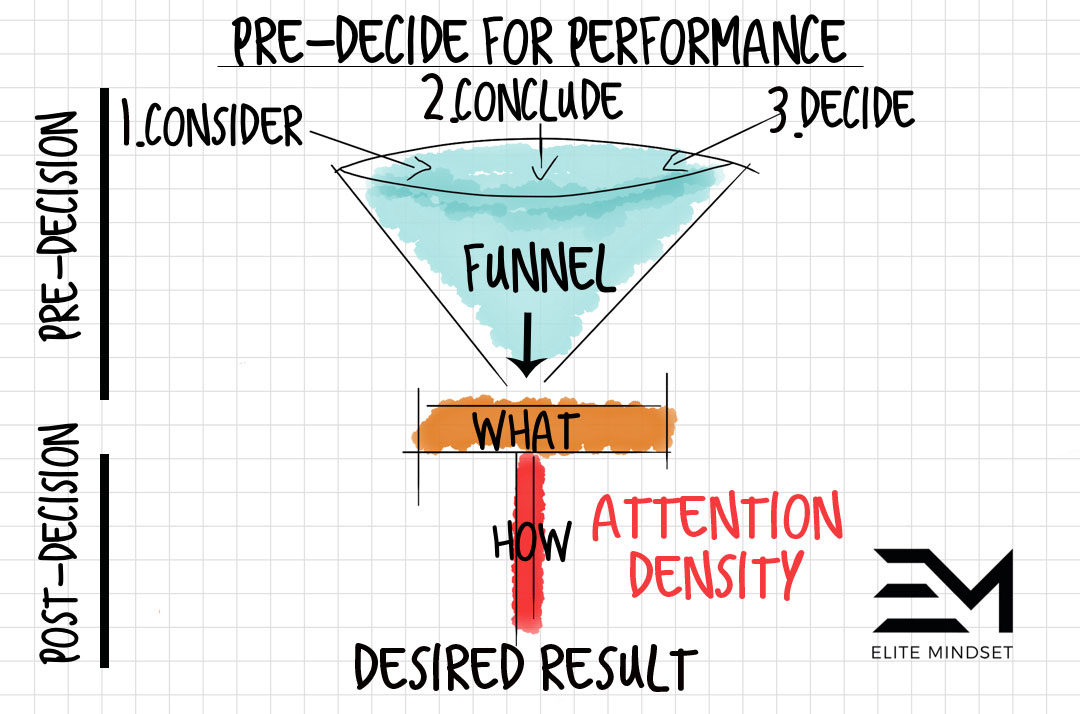You’ve Already Decided: How to Outsmart Yourself for Elite Performance

You’ve Already Decided: How to Outsmart Yourself for Elite Performance
Head coach of the Alabama Crimson Tide, Nick Saban, is arguably the most successful college football coach in college football since 2007. He and his teams have won the national championship in 2009, 2011, 2012, 2015, 2017. And the years he and his teams haven’t won the championship, they are always present among the top teams in the nation.
MAKE THE COMPLEX SIMPLE
His coaching style is simple: Make complex things simple. Listen to Saban speak at a conference, seminar, or practice, and you’ll quickly realize that college football’s most successful coach is consistently preaching simplicity.

ESPN filmed a series of shows following Coach Saban’s interactions with many of his players at practice. At one practice, Coach Saban was visibly upset with his team about their physical and mental performance. He blew his whistle loudly and waved the entire team to the center of the field. Once every player surrounded him and took a knee, he said with intensity, “Everyone, stop talking. For the rest of the practice. No more excuses. No more why you can’t do something. Everything I need to know about you I can watch. The simple truth is that you’ve already decided how you would show up at this practice before you ever got here. You’re just performing at the level you already decided.”
FOR HIGH PERFORMERS IN SPORTS AND OTHER FIELDS
The simple concept of pre-decision isn’t just for sports. It’s important in business too. Recently I was talking to my good friend Steve Schiro, former Senior Leader and Corporate Vice President with Microsoft for 18 years, founding board chair on the Positive Coaching Alliance, and founder of Choose Your Playbook. He said, “At the highest levels of Microsoft, simplicity was crucial. If it wasn’t simple, we knew we had more work to do.”
Why have so many of the greatest high-performers with elite mindsets spent so much effort simplifying ideas and concepts? Pre-deciding is a simple concept, but practicing it is a more challenging task.
DEFINITION OF A DECISION
Before we talk about the benefits of pre-deciding, we need to uncover the definition of the word “decision”.
- The most fundamental definition of “decision” is: a conclusion or resolution reached after consideration.[i]
- The etymology of the word decision, from Latin, is:
- “de”- “off”
- “cision” [ii]- “to cut away”
- “pre”[iii] – “before” in time or place
Therefore, when we make a decision, we are “cutting away” and removing all other options. And when we pre-decide, we are pre-cutting away and choosing one thing over many things. In other words, we are pre-deciding what we are going to cut away instead of making the decision in a particular moment. When we decide is the crucial question. Elite performers with elite mindsets waver less in the moment because they have pre-decided their actions, behaviors, or mindsets that put themselves in a future optimal circumstance.
- What this means is that if you’ve already pre-decided that you’ll go to the gym 5 days a week, there’s no longer a choice whether you’re going or not today. You’ve already decided.
- It means that if you’ve already pre-decided not to eat junk food, there isn’t a decision to make today whether you’ll eat junk food. You’ve already decided.
- If you’ve already pre-decided to practice at your highest effort, there is no decision how hard you will work when practice begins. You’ve already decided.
WHAT PRE-DECIDING CAN DO FOR YOU
As Elite Mindset’s mental trainer in the field of leadership and sports psychology, I often talk about “figuring you out.” What motivates, challenges, and unlocks you will be different than anyone else. You alone have the responsibility of figuring you out.
Part of figuring myself (Gary Chupik) out was how and when I make decisions. Like everyone else, being disciplined is always a challenge. I used to decide every morning if I was going to go to the gym to work out. But as you can guess, deciding at 4am isn’t a great long-term idea! Then, I figured out that if I decide the night before, my actions would follow my pre-decision. That worked for a while, but if I went to bed late that night, it was easier to waver about going in the morning. Predictably, deciding the night before was only successful for a few months.

A NEW WAY
I needed a new way. I needed to pre-decide to live out my values, convictions, and who I was. I needed to pre-decide in advance what I was going to do.
I learned pre-deciding can increase your performance and lighten your mental load to fully focus on the small micro-goals that set yourself up for success.
I learned that I could pre-decide even longer than the night before or even a week in advance. I could pre-decide indefinitely that “I’m the type of person that insert what type of person you are here”. I could make my mental life easier by pre-deciding what I really want.
PRE-DECIDING IS AN IDENTITY ISSUE
Surprisingly, pre-decision is an identity issue. Who are you? How does your-kind-of-person show up to practices? To the gym? In high-pressure environments? To situations where no one is looking or paying attention?
What kind of person, coach, athlete, athletic director, or businessperson are you?
- Are you the type of person that comes prepared? Dialed in to be fully present and engaged in your task? Or are you the type of person whose mind gets distracted?
- You can pre-decide to be the type of person who has already decided to always give yourself extra time to prepare for a meeting.
- Are you the type of person who wants to show up on gamedays, but doesn’t respect yourself or your teammates enough to give them your best during practice?
- You can pre-decide to be the type of person who practices with the same focus and intensity as games, and who is intentional about what time you go to sleep for elite performance.
- Are you the type of person who eats clean 5 days a week, but loses discipline on weekends, which is 8-10 days a month? That’s between 26%-31% of a month!
- You can pre-decide to be the type of person who has already decided to minimize unhealthy things in your diet and have a plan for your nutrition.
- Are you the type of person who will lie to get out of a jam? To get ahead?
- You can pre-decide to always tell the truth, even if it hurts.
AN UNCOMMON SUCCESS STORY
I know it's extremely dangerous to write anything about your spouse. My wife Molly is a fierce introvert and hates being the center of attention in any way. She has never liked exercise. Did I mention she hates attention? I can’t remember the last time she “exercised”. Even though she’s not a new year’s resolution kinda gal, or even likes to make goals, she pre-decided to make exercise a part of her life, 6 days a week. She had no goal other than to exercise at least 30 minutes a day. Now, I’m sure we could identify all sorts of motivations, however, in the end, she’s hasn’t missed workouts for months. She pre-decided and focused her attention on the “how”.
HOW ELITE PERFORMERS CAN PRE-DECIDE TO HAVE AN ELITE MINDSET
I’m writing about this idea of pre-decision for which there are very little documentation and direct research done. There are numerous related sub-issues like mental health, goal-setting, motivation, the role of support, coaching, and much more. Because of my own applied client research, observation, and long-term and varied first-hand experience with pre-deciding, may I submit 4 helpful tips on how to make pre-deciding a useful tool in your high-performance tool bag?
- Make space to think. Creating mental “blue-sky” allows you to entertain the thoughts, actions, and mindsets you need to achieve your goals and vision. It is documented that many brilliant inventors spent numerous hours every week simply doing “blue-sky” thinking. Create some physical, mental, and emotional space from the hectic world to slow down and do some deep thinking. Practicing mindfulness is a good start.
- Decide what you want vs what you really want. What we want in a moment (ie: a piece of pizza) is different than what we really want: to lose weight so I can feel good about myself and my health. I wrote a previous article about what you want versus what you really want. You can read that article here. Discipline tastes better than regret.
- Focus your mind on the how, not the what. Once you’ve made your decision about what you want to do, cut away all other options and now focus your mind on figuring out how to sustain the decision you’ve already made. Constantly educate yourself. Be strategically creative, focused, and determined to be the kind of person that is disciplined and follows through on those things that make you better. Your future self will thank you!
- Up your attention density.[i] Focus is power. David Rock and Jeffrey Schwartz in their 2006 article, The Neuroscience of Change, talk about the neuroscience of changing habits. They state,
“Over time, paying enough attention to any specific brain connection keeps the relevant circuitry open and dynamically alive. These circuits can then eventually become not just chemical links but stable, physical changes in the brain’s structure.
…We now also know that the brain changes as a function of where an individual puts his or her attention. The power is in the focus.
…The term attention density is increasingly used to define the amount of attention paid to a particular mental experience over a specific time. The greater the concentration on a specific idea or mental experience, the higher the attention density. With enough attention density, individual thoughts and acts of the mind can become an intrinsic part of an individual’s identity: who one is, how one perceives the world, and how one’s brain works. The neuroscientist’s term for this is self-directed neuroplasticity.
Two things shape this changing of thoughts: the amount of time spent, and, how intense the focus is in that same time[ii]. Attention density continually reshapes the patterns of the brain.
What this all means is that the more you focus your life around seeing the change you want to see, the more likely you’ll create new neuropathways to accomplish that change. Educate yourself. Make the follow-through of your de-cision a priority (singular). Make it the sole focus of your life for a season.
CONCLUSION
Pre-deciding things in your life may feel constricting. But many also claim it can also be freeing. Former navy seal and author of the book Extreme Ownership[vi] and Jocko Willis often says, “Discipline is freedom.” Pre-deciding frees up mental space to focus in the moment and on the task using attention density. It shifts the question from “if” we will do something to “how” we will accomplish it.
Want to get join a growing nation of strong, disciplined, risk-taking, courageous, servant leaders? Sign-up on the home page to receive the Monday Morning Mindset free text message to challenge and encourage you to get better and be better.
[i] https://www.google.com/search?q=definition+of+decision&rlz=1C1CHBF_enUS809US809&oq=definition+of+decision&aqs=chrome..69i57j0l7.5990j1j4&sourceid=chrome&ie=UTF-8
[ii] https://www.etymonline.com/word/decision
[iii] https://www.etymonline.com/word/pre-
[iv] https://www.strategy-business.com/article/06207?gko=f1af3
[v] https://www.strategy-business.com/article/06207?gko=f1af3
[vi] Jocko also hosts a weekly podcast called the Jocko Podcast: https://jockopodcast.com/

